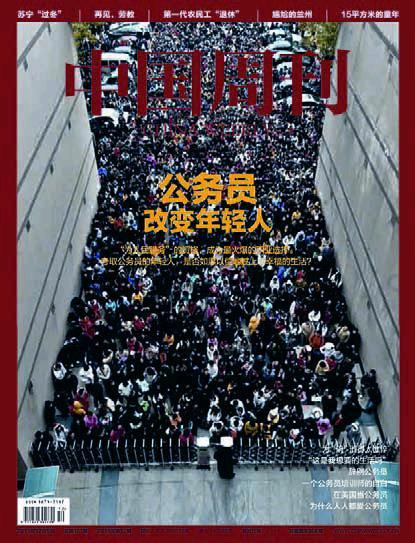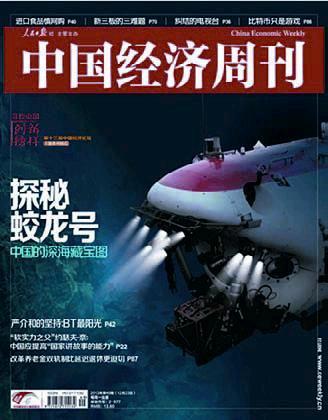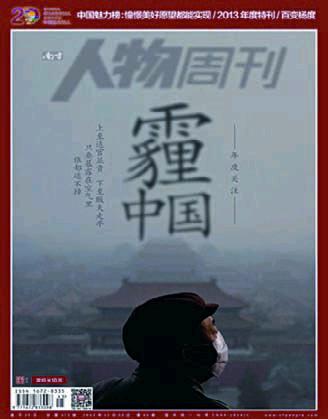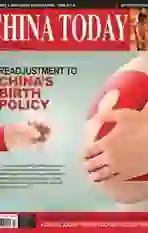On Chinese Media
2014-03-03

China Weekly
Issue No. 12, 2013, published December 5, 2013
Changing Attitudes towards Being a Civil Servant
Participants in Chinas 2013 national civil service qualification examination set a record again, topping 1.117 million. The number of examinees at local levels(provincial and municipal) were even more staggering– roughly 4.64 million. However, the total number of college graduates for the year was only 6.99 million.
When the generation born in the 1970s and early 1980s first entered the job market, a government job was considered far from desirable. The most soughtafter posts were with foreign companies, followed by private businesses and the media, whose operations and salaries were more market-based. But before we could notice it, times changed. The public sector of the economy has grown, while the non-public sector has experienced a slump. This shift has caused a shakeup both economically and psychologically. Chinese people generally sense fewer opportunities in their careers and consequently feel a keen sense of insecurity, leading to a change in perception about what constitutes a good job. With decent pay and benefits, the civil service sector now appeals to many, appearing like a goldmine.
The qualification exams can of course in the first place prevent nepotism, but they also draw in more brainpower and creativity than deserved. Most young people see the process as landing a well-paid, stable job, instead of seeing it as a way to serve the people or change the society. Those who harbor such wishes have slimmer chances to realize their dreams while jostling with the massive crowds.
China Economic Weekly
Issue No. 49, 2013, published December 23, 2013
Exploring Chinas
Deep-Sea World with Jiaolong Submersible
Chinas manned submersible Jiaolong set a new diving record for China on June 27, 2012, after reaching 7,062 meters below sea level, giving the vehicle access to 99.8 percent of the worlds ocean floor. As global land resources become scarcer, more and more countries are turning to the oceans. People are paying attention to combustible ice – the strategic resource with commercial exploitation prospects for the 21st century. So far, the Jiaolong has carried out 73 diving missions in the South China Sea, plus the eastern and northwestern Pacific Ocean, conducting extensive scientific research. One major task is to investigate the seabed outlet of combustible ice. Taking this as a beginning, China will further explorations of the mysteries of the ocean and map its deep-sea treasures.
CBN Weekly
2013, Issue No. 49, published December 23, 2013
A Decade in Newspapers
About 10 years ago, the newspaper market witnessed a boom in China. Morning newspapers encountered a rapidly growing group of white collar readers who wielded considerable consumer power and demanded more detailed news. Morning papers soon surpassed evening editions in most cities, with extensive circulation and sizable advertisement revenue. Data show that in 2002, 108 of the 147 evening papers in China changed to morning distribution. This boom also heightened public awareness, aging newspaper staff and readership also becoming a big issue. Adjusting the direction of newspaper management was expected to solve some basic problems.
There have been big changes over the past decade. In the U.S. and Europe, newspaper readership has gone into decline, trapped in a deep freeze. In China, we saw a high-speed ascent to a peak, and then also experienced a cold winter. Shrinking demand for print media has become an irreversible trend worldwide, and while newspaper staff have all anticipated welcoming readers back, no major newspaper has yet succeeded during these years.
Caijing
Issue No.1, published January 6, 2014
Two New Giants in the Financial Sector
In just a decade, Internetbased finance has emerged in China and shown rapid development, altering the landscape of Chinas financial sector. With the oncoming 4G era, alongside a gradual loosening of the countrys financial controls, emerging Internet giants are launching an innovation offensive to capture the online finance market. This battle is not simply about a reform of the financial channel or medium. It will remold Chinas Internet and financial industries.
The essence of the Internet is equal interactiveness and peerto-peer sharing. Banks and other financial institutions are seemingly hindering highly efficient connections. In the traditional financial sector, borrowing funds from the financial market through banks represents indirect financing, while borrowing in the security market is direct financing. Internet-based finance goes beyond both, and opens up a third path.
Internet finance will doubtlessly outperform traditional finance. In this brand-new battlefield, exploratory efforts by both Alibaba and Tencent will determine the speed of Chinas Internet finance in becoming more mature and achieving standardization.

Southern People Weekly
Issue No. 45, 2013, published December 30, 2013
Haze Enveloping China
In the 21st century, respirators twice went out of stock in China. At the beginning of 2003 when SARS first hit southern China, people in Beijing thought Guangzhou football fans wearing respirators to watch games was an overreaction. However, when the disease spread to the capital, respirators quickly sold out.
The haze issue is not as acute as the SARS virus though it harms peoples health incrementally. At the end of 2010, the capitals PM2.5 particulates were measured at 595 by the U.S. embassy in Beijing, exceeding the upper limit(500) for air quality monitoring. From then on, the Chinese public has begun to pay attention to this index of air quality. Respirators sold out again.
Chinas air pollution crisis poses serious challenges to the government. As air is a foundamental element, this issue affects every aspect of our lives, including the economy, politics and society, as well as foreign affairs.
